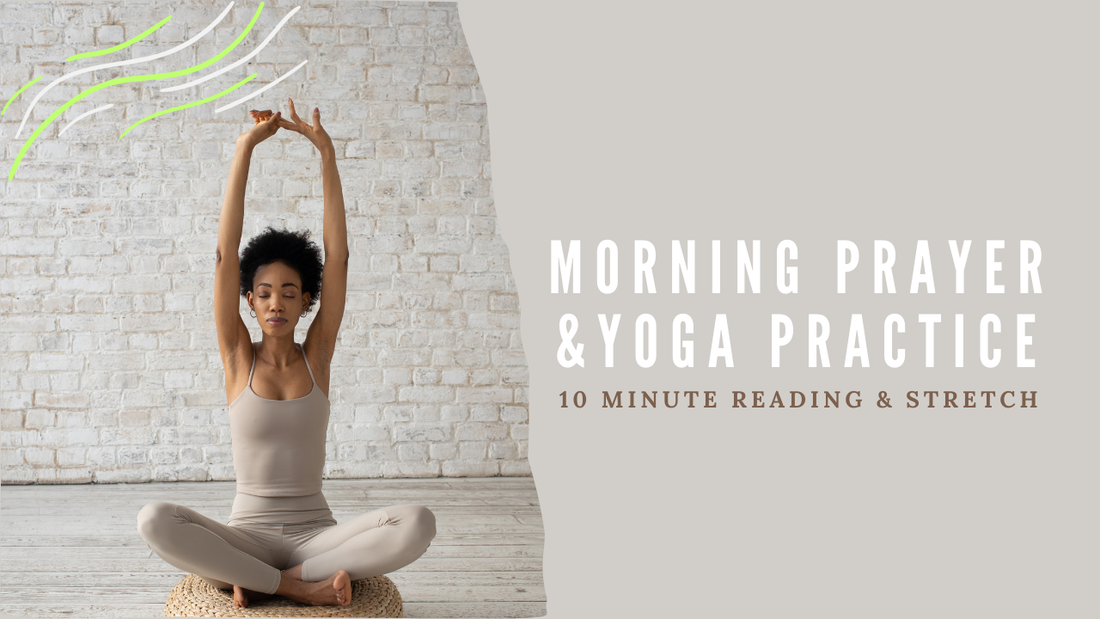
Wellness Through Fasting, Prayer & Yoga
Share
Fasting has been practiced for centuries—not just as a way to cleanse the body, but as a sacred discipline to draw closer to God. Saints, prophets, and spiritual seekers throughout history have fasted to quiet the noise of the world, humble the flesh, and open their hearts more fully to divine guidance. In Christianity, Moses, Elijah, and Jesus Himself all fasted—Jesus for 40 days in the wilderness (Matthew 4:2). Their example reminds us that fasting is not merely about what we give up, but what we gain: deeper communion with God.
“When you fast, do not look somber as the hypocrites do… But when you fast, anoint your head and wash your face, so that it will not be obvious to others that you are fasting, but only to your Father, who is unseen.” — Matthew 6:16-18
Many believe that fasting, when combined with prayer, meditation, and yoga, helps clear the spiritual channel so that God’s voice can be heard more clearly. It humbles the ego, sharpens the mind, and sensitizes the soul.
What Is Intermittent Fasting?
Intermittent fasting isn't a diet; it's a pattern of eating. The most common methods include:
✅ 16/8 method: 16 hours of fasting, 8-hour eating window
✅ 5:2 diet: Eating normally 5 days a week, reducing calorie intake on 2 non-consecutive days
✅ Alternate-day fasting: Fasting every other day
Benefits of Intermittent Fasting
-
Weight Management
IF can promote fat loss while preserving lean muscle mass. It naturally reduces calorie intake and boosts metabolism. -
Improved Metabolic Health
Studies suggest intermittent fasting improves insulin sensitivity and lowers blood sugar levels, potentially reducing the risk of type 2 diabetes. -
Cellular Repair and Longevity
Fasting triggers autophagy—a process where the body removes damaged cells, which may help with aging and disease prevention. -
Mental Clarity and Focus
Once the body adapts, many report increased mental clarity, likely due to stable blood sugar and increased production of brain-derived neurotrophic factor (BDNF).
Risks and Considerations of Intermittent Fasting
While beneficial, IF isn’t for everyone:
✔️ May cause fatigue or irritability, especially in the beginning
✔️ Not recommended for those with eating disorders, pregnant or breastfeeding women, or individuals with certain medical conditions
✔️ Could lead to nutrient deficiencies if not paired with a balanced diet
The Role of Meditation and Prayer
Fasting has spiritual roots in many traditions, often accompanied by meditation and prayer. These practices can:
⭐️ Support emotional resilience, helping to navigate the psychological aspects of fasting
⭐️ Increase mindfulness, making it easier to tune into true hunger cues and avoid emotional eating
⭐️ Deepen spiritual connection, creating space for reflection, gratitude, and purpose
A short daily prayer or mindfulness meditation can help quiet the mind and reduce stress hormones, which complements the physiological benefits of fasting.
Yoga: The Physical and Mental Bridge
Yoga is a natural companion to both fasting and meditation. Here’s how:
✔️ Enhances detoxification: Gentle yoga flows and twists can support digestion and the lymphatic system during fasts.
✔️ Promotes flexibility and circulation, reducing the fatigue that can accompany longer fasting periods.
✔️ Combats stress and anxiety, helping to stabilize the mood swings sometimes associated with changes in eating habits.
✔️ Encourages presence, aligning body, mind, and breath in a way that promotes balance and awareness.
Integrating All Four Practices: A Sample Day
Here’s how you might incorporate all four into a daily routine:
☀️ 7:00 AM: Wake up, hydrate, and begin with 10–15 minutes of meditation or prayer
⛅️ 8:00 AM – 12:00 PM: Engage in light yoga, journaling, and mindful movement (still within the fasting window)
🌥️ 12:00 PM – 8:00 PM: Eating window; focus on whole, nourishing foods and avoid distractions while eating
🌅 8:00 PM – bedtime: Light stretching, gratitude practice, or evening prayer
Affirmations for Your Fasting Journey
In moments of hunger or weakness, spiritual affirmations can offer strength and clarity. Repeat these as prayers or mantras throughout your day:
✔️ I am strengthened by the Spirit within me.
✔️ I am aligned with divine purpose.
✔️ I am disciplined, devoted, and deeply connected to God.
✔️ I am nourished by peace, not just food.
✔️ I am light, I am love, I am led.
When practiced with intention and awareness, intermittent fasting, meditation, prayer, and yoga can create a powerful synergy. They address health not just as the absence of disease, but as a holistic state of well-being—physical, mental, emotional, and spiritual.
Still, it’s important to listen to your body and consult a healthcare provider before starting any fasting regimen, especially if you have underlying health conditions.
Balance is key. Use these tools not as rules, but as supports on your journey to living with more clarity, vitality, and peace.
Sacred Support: Pure Energy Crystal Rings
To support your spiritual and physical wellness during fasting and prayer, we invite you to explore our Pure Energy Crystal Rings. Each ring is made with natural crystals selected for their vibrational healing properties and prayed over individually to ensure they’re filled with positive, sacred energy.
Whether you're seeking calm, clarity, protection, or spiritual alignment, there is a crystal for your intention. These rings serve as daily reminders of your journey and a wearable symbol of your commitment to higher truth and divine connection.
✨ Every crystal is prayed over, anointed, and tuned with good energy. Let it guide your mind and body back into alignment with your soul’s highest path.
🛒 Ready to wear your intention? Browse the collection now and experience the energy shift: Pure Energy Crystal Rings → https://pureenergycrystals.com
